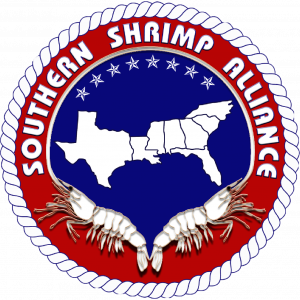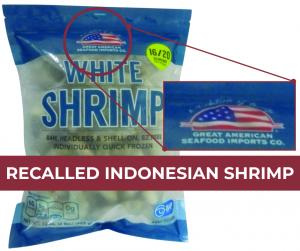Southern Shrimp Alliance Urges Consumers to Choose U.S. Wild-Caught Shrimp Amid Import Contamination Crisis
Recent recalls highlight ongoing safety failures in imported farm-raised shrimp while domestic fishermen continue to deliver superior quality
When consumers choose U.S. wild-caught shrimp, they're not only getting a superior product – they're supporting American jobs and proven food safety standards.”
TARPON SPRINGS, FL, UNITED STATES, September 29, 2025 /EINPresswire.com/ -- The Southern Shrimp Alliance (SSA) today urged American consumers to prioritize U.S. wild-caught shrimp following a disturbing pattern of contaminated imported shrimp products. Recent FDA recalls of Indonesian shrimp contaminated with radioactive cesium-137 and refusals of foreign shrimp adulterated with banned antibiotics underscore the critical safety differences between imported farm-raised shrimp and premium American wild-caught shrimp. SSA reminds families that choosing U.S. wild-caught shrimp delivers unmatched quality, safety, and flavor while supporting coastal communities.— John Williams, executive director of the Southern Shrimp Alliance
"The U.S. shrimp industry, comprised of multigenerational families, is the economic backbone of coastal communities throughout the South," explained John Williams, executive director of the Southern Shrimp Alliance. "When consumers choose U.S. wild-caught shrimp, they're not only getting a superior product – they're supporting American jobs and proven food safety standards."
The Gold Standard: U.S. Wild-Caught Shrimp
In stark contrast to the problematic imports — most of which are farm-raised — American shrimp fishermen harvest premium, wild-caught shrimp using sustainable practices in the Gulf and South Atlantic. As a result of their natural environment, U.S. wild-caught shrimp offer superior taste, texture, and nutritional value while supporting coastal communities.
America’s shrimp fishery is the most sustainable shrimp trawl fishery in the world, employing sustainable harvesting methods and gear refined over generations. U.S. fishermen operate under strict federal oversight with comprehensive testing and monitoring. Choosing U.S. shrimp rewards environmental stewardship, safe labor practices, and stringent food safety standards.
Troubling Pattern of Contaminated Imports
Recent events show why choosing domestic shrimp matters more than ever. The FDA's ongoing recalls of Indonesian shrimp contaminated with radioactive cesium-137 represent just the latest safety failure in a disturbing pattern. So far in 2025, FDA has refused over 60 entry lines of imported farm-raised shrimp for contamination with banned antibiotics and fungicides, a significant increase over previous years.
Adding to concerns, the vast majority of these adulterated shipments originated from processors certified under Best Aquaculture Practices (BAP) standards, raising serious questions about the reliability of third-party certification.
Critical Regulatory Gaps
Unlike the European Union, the FDA lacks the authority to destroy contaminated imports – these products are simply refused at the border and may be reshipped elsewhere. With FDA testing only 0.1% of seafood entry lines for veterinary drug residues, this represents a massive consumer protection gap.
The SSA supports bipartisan efforts by Representatives Higgins and Carter to pass the Destruction of Hazardous Imports Act, which would grant the FDA the authority to destroy contaminated food products. The FDA can already destroy contaminated drugs and medical devices. Until then, loopholes that allow rejected food to re-enter through other points of entry without further scrutiny undermine our food safety system.
While academics have continued to identify the health risks posed by the U.S. market’s over-reliance on imported seafood, the Department of Health of the state of Louisiana recently posted a warning encouraging the consumption of local seafood:
“The Louisiana Department of Health encourages residents of and visitors to the state to eat Louisiana seafood whenever it is available; imported seafood carries the risk of possible contamination by physical, chemical, and/or microbiological hazards.”
This week, Texas Department of Agriculture Commissioner Sid Miller, responded specifically to the ongoing recalls of Indonesian shrimp for radioactive contamination in a media statement:
“Imported shrimp sold in 31 states has been recalled over radioactive contamination concerns, and that’s flat-out unacceptable. Americans deserve safe, clean food, not imports handled under shady, unsanitary conditions. This is exactly why folks ought to only buy wild-caught Texas shrimp, where quality, freshness, and safety are second to none.”
How to Identify Authentic U.S. Shrimp
Consumers can ensure they're purchasing genuine American shrimp by following these guidelines:
-- Check Country-of-Origin Labeling (COOL): For minimally processed shrimp, origin information appears in fine print on the package back under ingredients.
-- Ignore Front-Package Marketing: Deceptive packaging often features American flags and patriotic colors and ocean imagery regardless of actual origin. Several recalled contaminated Indonesian shrimp products prominently displayed a U.S. flag on the packaging while containing Indonesian farm-raised shrimp.
-- Ask Questions: When dining out, specifically ask servers about the origin of shrimp. Many restaurants fail to accurately disclose this crucial information, which is why states are independently passing disclosure laws.
When consumers select U.S. wild-caught shrimp, they receive guaranteed quality, safety, and flavor while supporting American jobs and sustainable fishing practices. The Louisiana Department of Health specifically encourages residents and visitors to choose Louisiana seafood when available, noting that imported seafood carries risks of physical, chemical, and microbiological contamination.
About the Southern Shrimp Alliance
SSA represents U.S. shrimp fishermen, processors, and related businesses across eight states to ensure the continued vitality and existence of America’s shrimp industry.
Deborah Long
Southern Shrimp Alliance
+1 804-360-0074
email us here
Visit us on social media:
Instagram
Facebook
X
Legal Disclaimer:
EIN Presswire provides this news content "as is" without warranty of any kind. We do not accept any responsibility or liability for the accuracy, content, images, videos, licenses, completeness, legality, or reliability of the information contained in this article. If you have any complaints or copyright issues related to this article, kindly contact the author above.


